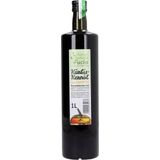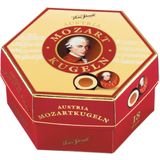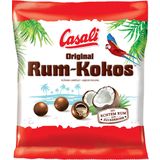Pomegranate - The Antioxidant Bomb
The sweet and sour taste of the pomegranate has been adored for millennia. New research suggests that it could be even healthier than previously thought.
The pomegranate has accompanied mankind for a long time. It was mentioned in the Bible and the Koran, as well as in ancient mythology.
Pomegranates often played a role in Greek myths. For example, the pomegranate was used to explain the origin of the seasons. Hades, the god of the underworld, kidnapped Persephone because he wanted her as his wife. Her mother, the fertility goddess Demeter, grieved so much that plants stopped growing. This period of grief became winter. Without food people died. Therefore, the other gods pleaded with Hades to release Persephone. And he did. Since Persephone ate a few pomegranate seeds in the underworld, and no one who had tasted the food of the dead could reside permanently in the upper world, Persephone had to spend four months a year in the underworld. Thus Persephone returns to the underworld during the winter months, then comes back to the upper world bringing spring with her.
The pomegranate's repeated mention in Greek mythology is not surprising, as it probably comes from Western and Central Asia which are practically on the doorstep of Greece. Today the plants grow worldwide in tropical and subtropical climates. They arrived in South America through Spanish colonisation and thrive in the Mediterranean as well.
Appearance
Pomegranates grow on small trees or shrubs that grow up to five meters high and have a reddish-brown to gray bark.
The fruits themselves are about the size of apples, with an orange-red to red-brown colour. The fruit is not a true berry but falls into a grey zone. Its pulp is neither fleshy nor woody. The interior of the fruit is crisscrossed with several seed chambers which contain around 400 seeds. Each seed is enclosed in a transparent membrane which is filled with juice.
Pomegranate juice can also be made into wine which is perfect for refining game, poultry and fruit salads.
Ingredients
The nutritional contents of a pomegranate are impressive. In addition to many trace elements and minerals, the juice contains many antioxidants such as flavonoids and polyphenols. The amount of polyphenols is even higher than in red wine and blueberries.
Furthermore, an increasing number of studies indicate that pomegranates may help with cardiovascular disease, arthritis, inflammation, and even cancer. Although not conclusive, pomegranates can be said to be very healthy.
Preparation
Caution! Pomegranate juice stains are very difficult to wash out. So be careful!
There are several ways to get the seeds out. One way is to cut the pomegranate in half, then tap and hold the shell until the seeds fall out. It helps to roll it on a flat surface while pressing lightly first - this helps loosen the seeds.
You can also scoop out the seeds with a spoon. It is best to get a bowl of water to help in this case. The seeds sink to the bottom while the shell floats on the surface.
The fastest way is to simply squeeze the fruit. One pomegranate yields about half a glass of juice.
Latest reviews
-
 3.0 (2)
3.0 (2)Holle Organic Happy Sticks - Pumpkin Rosemary, 100 g
- For children 3 years +
- Made with Demeter flours
- Seasoned with sea salt
€ 2,19 (€ 21,90 / kg)Not available at the moment
-
 4.9 (7)
4.9 (7)Naturprodukte Fuchs Pumpkin Seed Oil PGI, 1 l
-3%- A culinary specialty
- Unique taste
- Thick & dark green in colour
€ 22,21 € 22,99 (€ 22,21 / l)Delivery by April 29
-
 4.9 (42)
4.9 (42)Austria Mozartkugeln Chocolate Pralines in a Box, 18 pieces (297 g)
- With marzipan and nougat
- Covered in dark chocolate
- Perfect as a gift
€ 7,99 (€ 26,90 / kg)Delivery by April 29
-
 5.0 (24)
5.0 (24)Casali Rum Coconut Chocolates, 1 kg
- With a liquid rum core
- With a lot of crispy milk chocolate
- Like going on a summer holiday
€ 20,99 (€ 20,99 / kg)Delivery by April 29
Magazine Articles:
Discover Piccantino :
-
Austria: Free standard delivery from € 49,90
-
Free
returns -
24-hour shipping
More than 11.500 products
